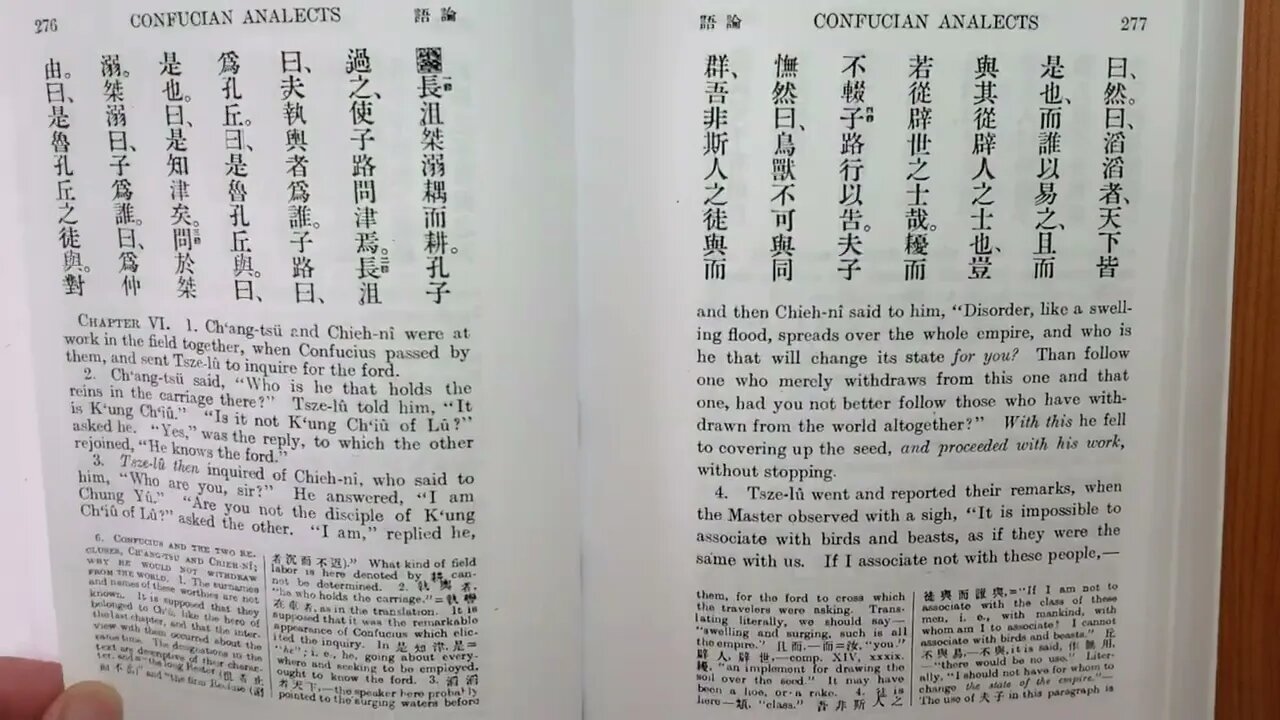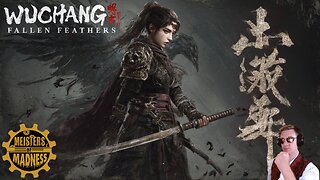Premium Only Content

Four Books 030 Confucian Analects The Great Learning The Doctrine of the Mean Works of Mencius S030
Four Books 030 Confucian Analects The Great Learning The Doctrine of the Mean Works of Mencius S030
Reading the Classics cold reading, unrehearsed. Reading main translation and small footprint notes. This appears to be a complicated book, dry and difficult to "see" as the print is very small.
This is a rough interpretation of the Works of Confucius and Mencius. Required reading for all Chinese for higher education examinations and government service. Reading was required in order to be considered an educated man.
The Chinese in the book is very "old" unlike old English, the terms and styles can be misconstrued, and the English translation can be misleading if not completely missing the heart of the meanings. Most are direct translations and missing the soul of the language.
Size: 14.34 x 22.59 cms, Language: - English, Pages 606.
Reprinted in 2015 with the help of original edition published long back . This book is Printed in black & white
Compiled by disciples of Confucius in the centuries following his death in 479 B.C.E., The Analects of Confucius is a collection of aphorisms and historical anecdotes embodying the basic values of the Confucian tradition: learning, morality, ritual decorum, and filial piety
What the great learning teaches, is to illustrate illustrious virtue; to renovate the people; and to rest in the highest excellence. The point where to rest being known, the object of pursuit is then determined; and, that being determined, a calm unperturbedness may be attained to.
The Great Learning places great emphasis on how individuals can reconnect with the spontaneous operation of these moral senses, while The Doctrine of the Mean stresses that these senses are held in common, and therefore serve as the key political connection between rulers and their people.
The most important of these teachings include jen, or “humaneness;” i, or “righteousness;” li, or “propriety/ritual;” and hsing, or “human nature.” Hsiao, or “filial piety,” is also a vital concept, one that is central for young people growing up in the Confucian tradition.
The Great Learning was written and later published as its own book, to serve as an introduction and foundational guide for the further study of Confucian texts.
Confucius believed that all people–and the society they live in—benefit from a lifetime of learning and a moral outlook. Confucius was a Chinese philosopher, politician, and teacher whose message of knowledge, benevolence, loyalty, and virtue were the main guiding philosophy of China for thousands of years.
Confucius's teachings were meant to be advice for the rulers of China. 5. Confucius said people should practise five virtues: kindness, goodness, honesty, modesty, wisdom and trustworthiness
The Mencius (Chinese: 孟子; pinyin: Mèngzǐ; Old Chinese: *mˤraŋ-s tsəʔ) is a collection of conversations, anecdotes, and series of genuine and imagined interviews by the Confucian philosopher, Mencius. The book is one of the Chinese Thirteen Classics, and explores Mencius' views on the topics of moral and political philosophy, often as a dialogue with the ideas presented by Confucianism. The interviews and conversations are depicted as being either between Mencius and the various rulers of the Warring States period, or with his students and other contemporaries. The book documents Mencius' travel across the states, and his philosophical conversations and debates with those he meets on his journey. A number of scholars suggest that the text was not written by Mencius himself, but rather by his disciples. The text is believed to have been written during the late 4th century BC.
#audiobook #videobook #education #confucius #chinesephilosophy #chinesehistory #chineseacademics #china #asia. #孔子 #孟子
#mencius #taoism #buddhism #confuciunism #哲学 #哲學 #孟子 #孔子 #中國 #中國聖人
Amateur Book Reader
-
 21:00
21:00
Analog Video Books - Read with Me
2 months agoHow Not To Invest 003 Barry Ritholtz 2025 Audio/Video Book S003
37 -
 LIVE
LIVE
The Rabble Wrangler
4 hours agoSunday Shootouts in Battlefield 6 - Phantom Edition Giveaway!
96 watching -
 LIVE
LIVE
Meisters of Madness
2 hours agoWuchang - Part 6
60 watching -
 34:55
34:55
Stephen Gardner
4 hours ago🔥Trump Admin FINALLY shutting it ALL DOWN!
40.1K83 -
 LIVE
LIVE
CassaiyanGaming
3 hours agoBattlefield 6 Open Beta Weekend!
31 watching -
 1:03:41
1:03:41
The Mel K Show
5 hours agoMel K & Mike L | Free Energy & A Better Way Forward | 8-17-25
46.6K35 -
 LIVE
LIVE
GritsGG
7 hours agoRanked Crim 2! Most Wins 3390+ 🧠
415 watching -
 20:54
20:54
Forrest Galante
9 hours agoPrivate Tour of World's Largest Animal Sanctuary
73.6K15 -
 LIVE
LIVE
JdaDelete
23 hours ago $1.37 earnedFinal Fantasy VII Rebirth | Jdub's Journey Part 12 | Nibelheim
72 watching -
 1:08:50
1:08:50
Wendy Bell Radio
13 hours agoWeekends With Wendy
85.2K150